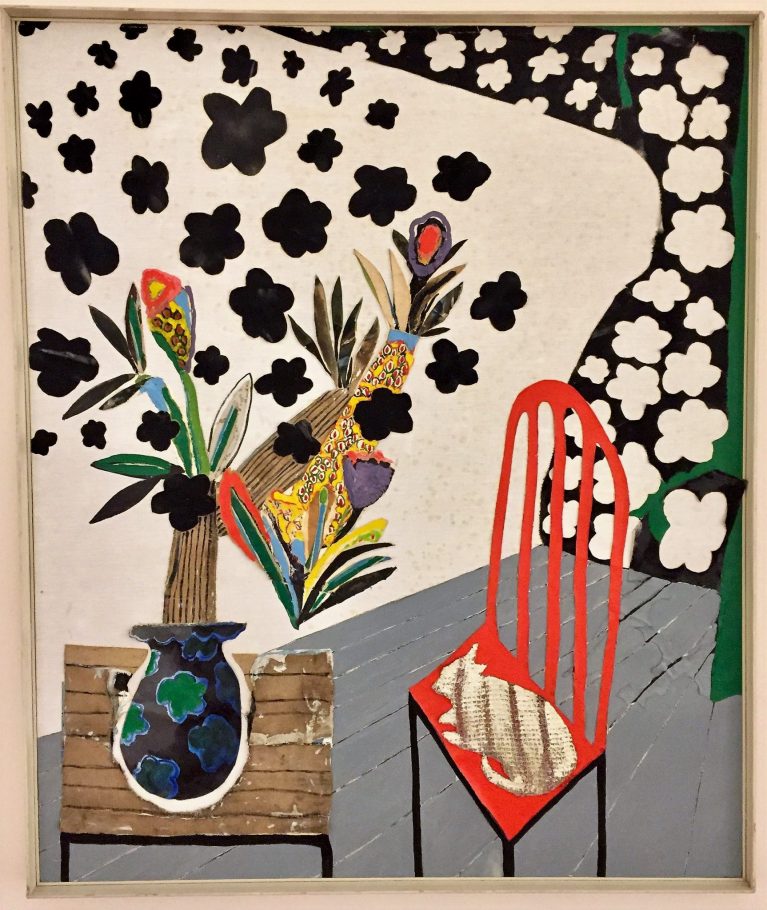Español abajo
In this Movement Monday Activity, create a replica of a famous work of art using your body and household found objects.

Benny Andrews, Interior with Cat, 1988, Oil and collage, Gift of the Benny Andrews Foundation
Painting is the practice of applying paint, pigment, color or other media to a solid surface. The medium is commonly applied to the base with a brush, but other implements, such as knives, sponges and airbrushes, can be used. In art, the term painting describes both the act and the result of the action.
Supplies
Household materials, Old clothes, Bed sheet
Instructions
Step 1: Decide on a famous painting or sculpture that you would like to recreate. What about this artwork makes you want to act it out?
Step 2: What elements make up the artwork that you are referencing? Are there objects of a certain size, color or shape depicted? Notice in the example the person found objects that were green and a similar size to the parrots depicted in the painting. Find safe household items with the help of a parent or guardian to make your replica.
Step 3: Look at the background of the artwork? What color or texture is it? If you’re recreating a sculpture, imagine a background for it. Find a background that compliments your artwork. You can use a blanket or bed sheet to help create a background.
Step 4: After setting up the background and found objects, find clothes or accessories that add detail to your replica.
Step 5: Arrange all of the found objects together and act out the painting or sculpture you chose. Have your parent or guardian take a picture of your completed replica.
Vocabulary
Replica – a copy closely resembling the original work relating to its shape and appearance.
Found object – a thing that someone else has given or thrown away that is often repurposed by artists
SEE MORE FUN AT-HOME ACTIVITIES FOR KIDS ON THE O BLOG!
QUESTIONS? EMAIL EDUCATION@OGDENMUSEUM.ORG
________________________________________________________________________
Lunes de movimiento: Conviértete en una obra de arte famosa
En esta actividad de lunes de movimiento, crea una réplica de una obra de arte famosa utilizando tu cuerpo y objetos encontrados en tu hogar.

Benny Andrews, Interior with Cat, 1988, Oil and collage, Gift of the Benny Andrews Foundation
Pintar es la práctica de aplicar pintura, pigmento, color u otros medios a una superficie sólida. El medio se aplica a la base comúnmente con un pincel, pero se pueden usar otros instrumentos, como cuchillos, esponjas y aerógrafos. En el arte, el término pintura describe tanto el acto como el resultado de la acción.
Materiales
Objetos hogareños, ropa vieja, sábanas.
Instrucciones
Paso 1: Decide qué pintura o escultura famosa te gustaría recrear. ¿Qué te hace querer representar esta obra de arte?
Paso 2: ¿Qué elementos componen la obra de arte a la que haces referencia? ¿Se representan objetos de cierto tamaño, color o forma?Observa cómo en el ejemplo, la persona encontró objetos que eran verdes y de un tamaño similar a los loros representados en la pintura. Encuentra artículos domésticos seguros con la ayuda de un padre o tutor para hacer tu réplica.
Paso 3: Observa el fondo de la obra de arte. ¿De qué color o textura es? Si estás recreando una escultura, imagina un fondo para ella. Busca un fondo que embellezca tu obra de arte. Puedes usar una manta o sábana para ayudar a crear un fondo.
Paso 4: Después de montar el fondo y los objetos encontrados, busca ropa o accesorios que agreguen detalles a tu réplica.
Paso 5: Organiza todos los objetos encontrados juntos y representa la pintura o escultura elegida. Haz que tus padres o tutores tomen una foto de tu réplica terminada.
Vocabulario
Réplica: una copia que se parece mucho a la obra original en relación con su forma y apariencia.
Objeto encontrado: objeto que alguien donó o descartó y que los artistas reutilizan para hacer arte.
¿PREGUNTAS? ENVÍA UN EMAIL A EDUCATION@OGDENMUEUSM.ORG
¡VISITA THE O BLOG PARA MÁS RECURSOS!
Translation by Agostina Coll
